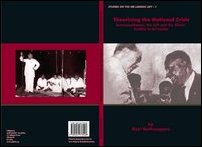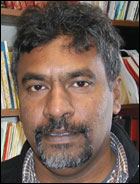|
|

Tamil Left in Sri Lanka revisited
[TamilNet, Thursday, 13 September 2007, 02:12 GMT]
"The majoritarian nationalists have reframed the national question as a ‘terrorist problem’ and displaced it from the historical and political domain to which it belongs. They have couched their call for a military solution in a discourse of ‘sovereignty and territorial integrity’ of the majoritarian unitary state and linked it to the so called global war on terror at the same time. Now it is official that the main problem is ‘terrorism’ which has to be defeated before any ‘political solution’ can be found. The real meaning of this position is that the military solution is the political solution," writes Professor N. Shanmugaratnam, in his foreword to Ravi Vaitheespara's book on Tamil Left.
 Photo on the front cover of the book: Chairman Mao receiving Shanmugathasan
Dr. Ravi Vaitheespara's book, 'Theorizing the
National Crisis: Sanmugathasan, the Left and the Ethnic Conflict in Sri Lanka,' consisting of two research papers, 'Towards a Tamil Left Perspective on the Ethnic Crisis in Sri Lanka,' and 'The Wisdom of Hindsight: Sanmugathasan, the Left and the National Crisis in Sri Lanka,' is published by the Social Scientists’ Association, Colombo, and is scheduled to be released this month. Dr. Ravindiran Vaitheespara is an assistant professor and co-ordinator, Postcolonial South Asian and African Studies Group, of the Department of History, University of Manitoba, Canada.  Professor Ravi Vaitheespara
The papers critically review the roles played by the eminent Tamil left politicians such as P. Kandiah, who belonged to the CP and was the first and so far the only leftist to win a parliamentary seat in the Tamil speaking north of the country, V. Karalasingham, a well known Trotskyist theoretician of the LSSP, who left the party in the sixties and returned to it after a while, V. Ponnambalam, a popular Tamil politician who was with the CP for many years before he left it to found the shortlived ‘Red Tamil Movement’, and N. Sanmugathasan (popularly known as Shan), the leading trade unionist and theoretician of the CP, who initiated an ideological debate within the party and led the Marxist-Leninist (Maoist) wing which became the Communist Party (Marxist-Leninist, also known as the Peking wing) in 1964. The following are excerpts from ' Interrogating an Obscured Legacy', the introduction to the book by veteran scholar N. Shanmugaratnam, Professor of Development Studies and Head of Research, Department of International Environment & Development Studies, Noragric, Norwegian University of Life Sciences:
- In post-colonial Sri Lanka, the national question posed a formidable political challenge to the liberal democratic and Marxist (Left) parties in a Westminster type parliamentary system implanted by the British colonialists.
- Over the years, ethnicity has trumped class in Sri Lanka, which today is an exemplar of how an externally implanted liberal democratic system can lend itself to machinations by political parties that resorted to communalism and communalisation as a shortcut to power. The institutionalisation of ethno-majoritarianism has been carried out by ‘democratic’ means. Indeed this is a dark side of our democracy in which universal franchise without safeguards for the numerically smaller ethnic groups was turned into a tool to deny them a meaningful role in political decision making, which, in the long run, has subverted both democracy and the creation of an inclusive, united Lankan state.
- There was a Sri Lankan state without a Sri Lankan nation, and the government’s language policy represented a major step towards transforming the colonial state into a Sinhala Buddhist state.
- The Left movement, represented by the Lanka Samasamaja Party (LSSP) and the Communist Party (CP), remained a staunch defender of the rights of the minorities and stood against the powerful resurgence of Sinhala Buddhist majoritarianism until the end of the 1950s. The 1960s saw major splits in the LSSP and CP due to domestic as well as international causes. In the early 1960s, both parties decided to adopt a conciliatory approach towards Sinhala Buddhist nationalism and join a united front with the Sri Lanka Freedom Party (SLFP).
- They were unable to prevent the systematic communalisation and desecularisation of the state let alone advance the class struggle within it. Shan’s original warnings on the political consequences of their capitulation came true. He reiterated that the LSSP and CP had been complicit in perpetuating neo-colonialism in Sri Lanka as the SLFP, with which they collaborated, was not so different from the UNP in its subservience to imperialism. He had all along held the view that the independence of 1948 did not mean decolonisation but a transition from direct colonial rule to indirect neo-colonial rule. He contended that the so called middle path advocated by Bandaranaike, though it appeared progressive in some respects, was certainly not the way to free the country from neo-colonialism.
- Shan exposed the JVP’s petty bourgeois shortcomings and communalism. Vaitheespara has put to good use his access to Shan’s unpublished writings about the JVP. We learn from him that in 1993, just before his death, Shan had written that the JVP had become ‘an anti-working class, anti-Tamil, counter revolutionary and potentially fascist force’. Of course the JVP would disagree with this, but its warmongering and ethno-majoritarian alliances make it resemble a lot to the JVP that Shan has described.
- Shan, the revolutionary who dared to challenge the age old institution of untouchability in Jaffna Tamil society by spearheading a militant mass movement against it, and who led the Red Flag Union that mobilised large sections of the disenfranchised and over-exploited Tamil plantation workers to demand their rights during 1966-1970, chose to be aloof from the burgeoning Tamil militancy in the north in the 1970s and early 1980s.
- When Tamil parties and youth organisations raised the demand for self-determination and nationhood, Shan argued that the Tamils were not a nation, since they (as a community) did not meet Stalin’s Marxist-Leninist definition of a nation. I remember a discussion I had with a young Tamil militant in the1970s. In a long exchange of views with the Tamil youth from Jaffna, I defended Shan’s position. He brought the long discussion to an end with the following statement: ‘Shanmugathasan may think we are not a nation but I am telling you we Tamils think and feel we are a nation.’ That was more than five years before Benedict Anderson’s ‘Imagined Communities’ appeared in print!
- Shan’s change of mind happened during and after the anti-Tamil pogrom of July 1983. What he saw and personally experienced in those seven days in Colombo and the rapidly changing political situation in the North-East made him rethink his long-held view on the Tamil struggle. It is relevant to recall that Shan had talked about the futility of trying to win the rights of the Tamil people by parliamentary means even before 1983. As a minority, Tamils would lose in the ‘number game’, he would say.
- Indeed the post-1983 July politico-military situation in the North-East showed the irrelevance of parliament and the inevitability of the armed struggle. The conflict had reached a point where the broad masses of the Tamil people had lost faith in the Sri Lankan parliamentary system and the state and were beginning to extend their support to the armed struggle.
- The situation in the North-East was quite different from what existed in the South in 1971 when the JVP revolted. What was happening in the North-East was in some ways close to the objective and subjective conditions for revolutionary action and ‘people’s war’ that Shan had been talking about in rather abstract terms in his political classes for many years, and it was happening while Shan and his party remained far removed from the scene politically.
|
|









